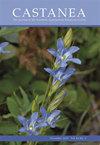The Flora and Wildland–Urban Interface of Doe Mountain Recreation Area: Adjuncts to Conservation
IF 0.3
4区 生物学
Q4 PLANT SCIENCES
引用次数: 0
Abstract
ABSTRACT An inventory of the botanical resources of Doe Mountain Recreation Area, comprising 3480 ha on the boundary of the Blue Ridge and Ridge and Valley ecoregions in extreme northeastern Tennessee, was conducted to help guide conservation-based management. A total of 486 species (including subspecies and varieties) was found comprising 95 families, 286 genera, 11 species tracked on the state rare plant list, 153 county records, and 77 exotic species. The relatively high ratio of county records to exotics indicated an area of conservation merit, but the ratio was lower than in floras from comparable areas in eastern Tennessee. The vast majority of county records were of common species, suggestive of an under-collected county. However, some of the noteworthy county records and state-listed species were from unusual habitats such as acid seeps, wetlands, and xeric ridges. Two species, Liatris virgata and Lycopodiella inundata, were new to the state. Water in the seep that supports L. inundata was an order of magnitude more acidic (pH=3.56) than at other sites. An analysis of the wildland–urban interface showed that the periphery of the site had more human impact than the county as a whole with the highest impact on the northern half; only 13% of the area was classified as uninhabited. Management recommendations, some of which were already adopted, targeted protection of acid seeps and xeric roadside slopes, curtailing mowing and herbicide use near a wetland that supports a state endangered species, and reconnaissance for exotic invasions in a biodiverse power line corridor.多伊山游乐区的植物群和荒地-城市界面:保护的附属品
摘要对美国田纳西州东北部蓝岭和岭谷生态区边界上3480公顷的多伊山游乐区进行了植物资源清查,以指导保护区管理。共发现486种(含亚种和变种),分属95科286属,国家珍稀植物名录11种,县记录153种,外来种77种。县记录与外来植物的比例较高,表明该地区具有保护价值,但该比例低于田纳西州东部可比地区。绝大多数的县记录是常见的物种,暗示了一个未被收集的县。然而,一些值得注意的县记录和国家列出的物种来自不寻常的栖息地,如酸性渗漏,湿地和干旱山脊。2种为该州新种,分别为Liatris virgata和Lycopodiella淹没。与其他地点相比,支持水蛭生长的渗漏水的酸性(pH=3.56)要高一个数量级。对野地-城市界面的分析表明,基地外围的人文影响大于整个县,其中北半部的人文影响最大;只有13%的地区被列为无人居住。管理建议,其中一些已经被采纳,有针对性地保护酸渗漏和干燥的路边斜坡,减少在支持国家濒危物种的湿地附近修剪和除草剂的使用,以及对生物多样性电力线走廊的外来入侵进行侦查。
本文章由计算机程序翻译,如有差异,请以英文原文为准。
求助全文
约1分钟内获得全文
求助全文
来源期刊

Castanea
生物-植物科学
CiteScore
0.50
自引率
25.00%
发文量
28
审稿时长
>12 weeks
期刊介绍:
Castanea is named in honor of the American Chestnut tree. Castanea is thebotanical name for Chestnuts, dating back to what the ancient Greeks calledthem.
The American Chestnut is a critically endangered tree that once made up 35%of the forests of the Eastern US before being devastated by a blight thatdestroyed up to 4 billion American Chestnut trees.
Castanea serves professional and amateur botanists by reviewing andpublishing scientific papers related to botany in the Eastern United States.
We accept papers relating to plant biology, biochemistry, ecology, floristics,physiology and systematics.
 求助内容:
求助内容: 应助结果提醒方式:
应助结果提醒方式:


